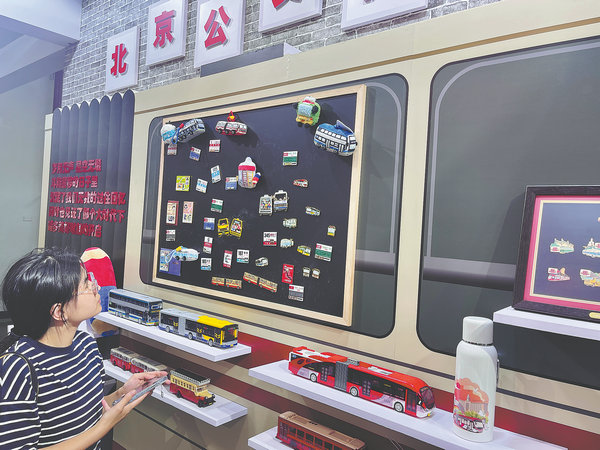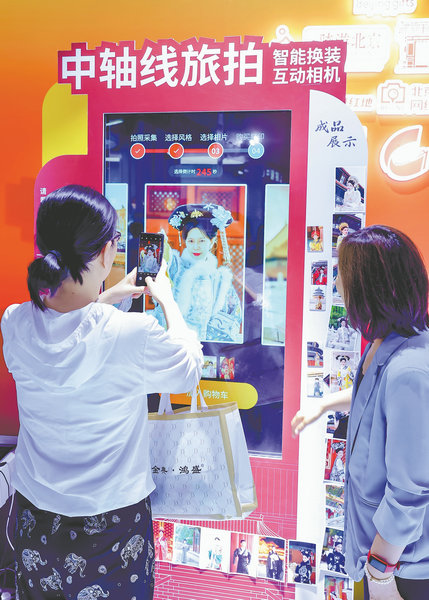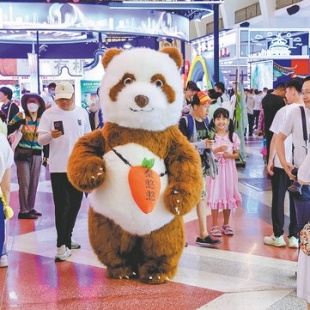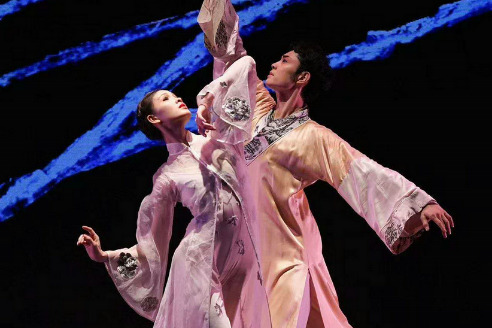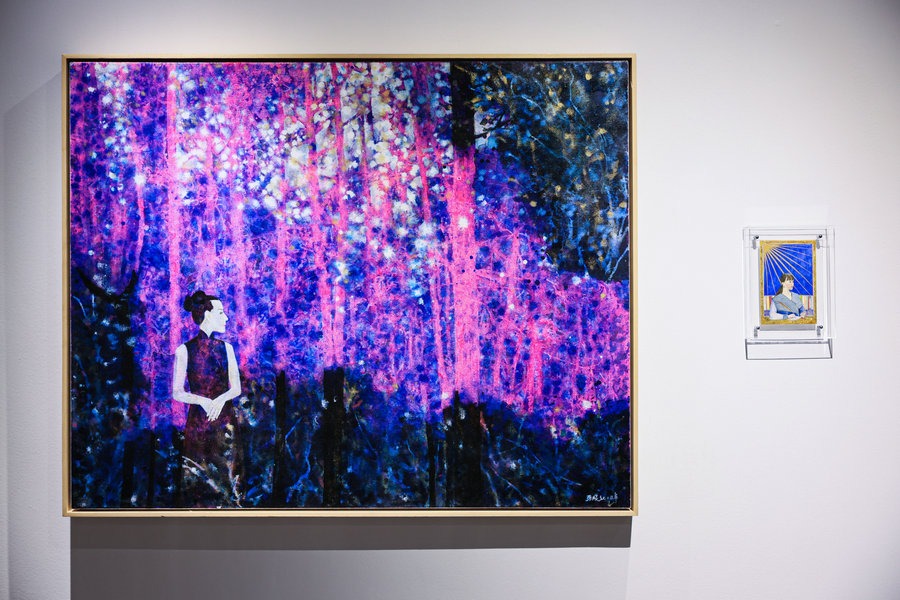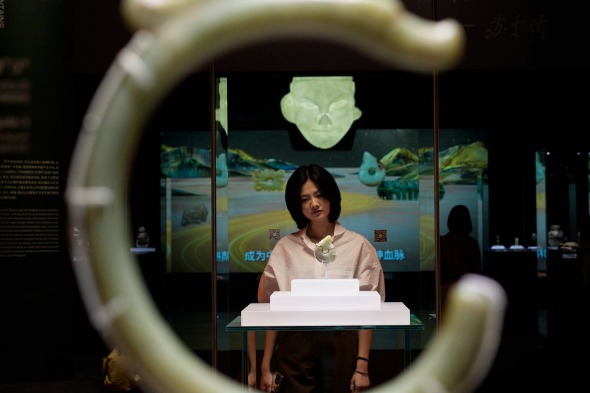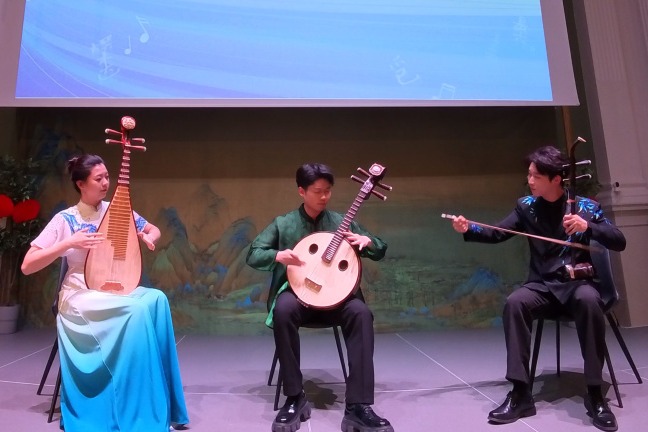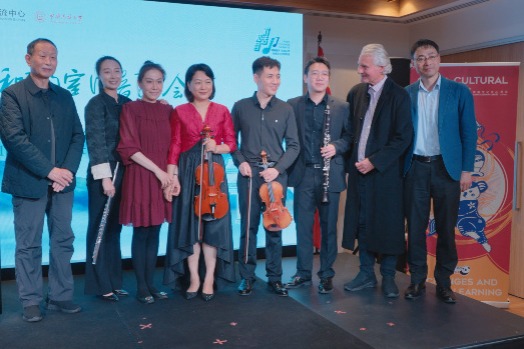A walk down Beijing's memory lane
Expo spotlighting the capital in the 1990s promotes tourism, digital experiences and cultural products, Yang Feiyue reports.

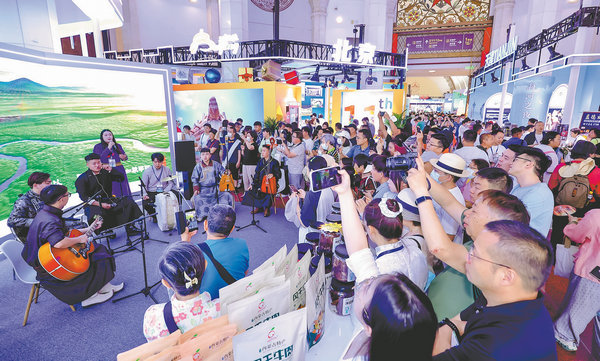
A traditional Beijing courtyard facade, models of vintage buses, retro refrigerator magnets, enamel mugs, and nostalgic courtyard illustrations transport one back to the capital city of the 1990s.
Visitors packed the booth set up by Jingweier Times, a cultural brand that has carved out a niche in capturing the charm of hutong, during the 2025 Beijing International Cultural and Tourism Consumption Expo from June 20 to 22 at the Beijing Exhibition Center.
"We want to give visitors a sensory flashback to feel like they've stepped into the streets of old Beijing," says Shi Dongyue, marketing director at the company.
"Through these familiar images, we hope to awaken the emotional connection many people have with the city's past."
Among their bestsellers is a line of enamel mugs, meticulously crafted using high-grade steel and eco-friendly enamel glaze.
"Though it's an everyday object, we've given it a new identity. Each mug is screen-printed with hand-drawn graphics of bus lines, hutong alleyways, and courtyard life," Shi explains.
Another standout item is their vintage bus stop magnet series, which includes 18 faithfully re-created designs featuring elements from well-known Beijing routes.
One design based on the Line 112, which served major industrial zones until its retirement in 2022, became a viral sensation on social media after a blogger posted a tribute to it on popular social media platform Xiaohongshu, or RedNote.
"It showed how deeply these routes are tied to people's memories," he notes.
The brand was among over 500 exhibitors across multiple themed zones, showcasing innovations from across the culture and tourism value chain at the expo that attracted more than 100,000 visits, up 40 percent over the second edition last year, according to its host Beijing Municipal Bureau of Culture and Tourism.
It highlighted global and domestic destinations, digital experiences, and creative cultural products. Tourism organizations from 22 countries, including Russia, South Korea and Japan, as well as approximately 40 international brands, presented immersive travel offerings, while domestic exhibitors from 12 provinces and 26 cities spotlighted China's cultural diversity.
"This year's expo was all about showcasing what's new, fun, and engaging," says Zhang Jing, director of the resource development division at the Beijing Municipal Bureau of Culture and Tourism.
"Visitors could find a wide range of cultural and tourism products from different districts of Beijing and across China, including newly launched creative items and interactive experiences. From AI-enabled installations and robot interactions to themed immersive spaces, we've tried to make the event highly participatory," Zhang adds.
The three-day event saw on-spot trade volume hit more than 210 million yuan ($29.3 million), up 23 percent over last year.
Visitors showed strong enthusiasm in buying, from small fridge magnets to big porcelain artifacts, Zhang observes.
At the national postal service provider China Post's booth, scenes from a curated selection of eight themed post offices highlighting such elements as Peking Opera, 24 solar terms and Central Axis, saw long lines of visitors waiting to take photos with a central backdrop displaying names and identities of the featured post offices and snatching up stamp-based cultural creative items.
A key highlight of China Post's exhibit was the commemorative postmark cancellation station, where visitors could get exclusive expo-themed postmarks stamped on postcards and other items, says Liu Fangxu, staff member at China Post's Xicheng marketing division.
"It proved a popular activity that combined cultural memory with tangible keepsakes," Liu notes, emphasizing its appeal to both philatelists and the general public.
The presence is part of China Post's increasing efforts to develop cultural and creative products that integrate traditional values with modern design and enable postal service to resonate with younger and more diverse audiences.
"Going forward, we plan to launch more collaborations, limited editions, and themed events tied to holidays and special occasions," Liu says, adding that the goal is to keep evolving and become a vital part of the broader cultural consumption ecosystem.
In addition to domestic cultural promotion, the overarching goal of the expo, Zhang emphasizes, is to reflect Beijing's growing international presence.
This year's expo saw participants from abroad nearly double from last year.
"Several embassies and tourism officials attended the opening ceremony, demonstrating strong interest in cooperating on inbound tourism," Zhang says.
At the international section of the exhibition, the embassy of Ethiopia in China highlighted a wide range of tourism products and cultural experiences in a bid to attract more Chinese travelers and increase visibility of Ethiopian exports.
One of the central displays was Ethiopia's traditional coffee ceremony, a deeply rooted cultural ritual that extends beyond drinking coffee.
"Coffee in Ethiopia is not just a beverage — it is a symbol of hospitality and social connection," says Mandefro Shiferaw, minister counselor of the Ethiopian embassy.
The Ethiopian delegation also introduced a variety of natural wonders and historical sites, including the Danakil Depression, one of the hottest places and lowest points (125 meters below sea level) on Earth, known for its volcanic activity, and Ethiopia's national parks and wildlife.
Shiferaw noticed that the country's ongoing efforts to increase agricultural exports have been boosted by China's duty-free policies for African countries, making it easier for Ethiopian exporters to reach the Chinese market.
While Ethiopia sees growing interest from Chinese consumers and businesses, he says Chinese tourist numbers remain modest compared to the global outbound tourism volume.
"We are working hard to change that," the counselor says. The goal is to surpass a million Chinese visitors in the near future through targeted promotion and improved accessibility.
Just a few booths away, specialties from the South Asian country Sri Lanka received unwavering attention from the visitors, as they did in previous two editions of the expo.
"The black tea has remained the top-selling item at our booth," says Wang Hao, a commercial representative with the embassy of Sri Lanka in China.
Wang notes that alongside black tea, Sri Lanka is gradually gaining traction in China with other exports such as cinnamon, spices like cumin, and tropical fruits including pineapples.
Wang considers the similarities between climate and culinary culture of China and Sri Lanka partly account for the popularity.
Chinese consumer interest is also being driven by a broader understanding of global culture, he points out.
"Today's Chinese travelers are more experienced and open-minded. They're not only exploring relatively new destinations in Sri Lanka but also learning more about the country's unique offerings — be it food, spices, or wellness products," Wang says.
Tourism is a growing focus as well.
"The number of Chinese tourists visiting Sri Lanka has been increasing every year," Wang notes.
A new direct flight route from Beijing to Sri Lankan capital Colombo is scheduled to resume in early July, operated by Sri-Lankan Airlines.
"This will make travel more accessible for people in northern China, complementing existing direct routes from Shanghai, Guangzhou (Guangdong province), Chengdu (Sichuan province), and Kunming (Yunnan province)."
Shi from Jingweier Times hopes events like the Beijing expo can help bring more visitors to the brick-and-mortar shops.
The company currently partners with over 150 offline retail locations across Beijing, including bookstores, museum gift shops, and cultural zones.
"Our customer base mainly includes Beijing locals born in the '70s, '80s, and '90s, who connect deeply with the imagery of their childhood," he says.
However, the company's products have also been extending appeal to visitors from outside, especially Jiangsu and Guangdong provinces and even overseas travelers, with their distinctive cultural identity.
"Through small objects, we're preserving big memories by having more people carry a piece of authentic, vibrant Beijing back home in their hearts," he says.
Contact the writer at yangfeiyue@chinadaily.com.cn
